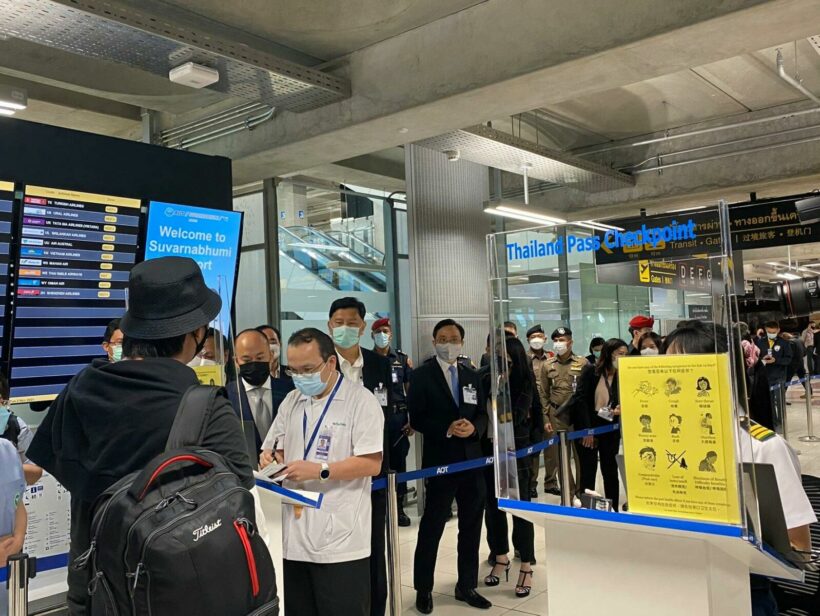Things to know about the Thailand Pass. And some rumours.

Ah, the Thailand Pass. Like it or hate it, it is what it is, and you’ll need to wade through it if you want to come to Thailand in the foreseeable future, both foreigners and Thais.
For a start, here’s the link to the application page for the Thailand Pass.
There’s a list of the 63 countries that are currently allowed to re-enter Thailand under the new ‘Test and Go’ system which only requires 1 night of ‘quarantine’ (despite the TAT saying that it’s “quarantine free”. It’s not.) List below…
WHO’S RUNNING THIS SCHEME?
The Thailand Pass, the entry documentation you need to get back to Thailand at this stage, is run by the Department of Consular Affairs who are par of the Ministry of Foreign Affairs. It is NOT run by either the Thai Immigration Department or the Ministry of Sports and Tourism, or the TAT.
The TAT (Tourism Authority of Thailand) is a marketing arm of the Ministry of Sports and Tourism. They organise the advertising for Thailand as a tourist destination and attend big travel shows and expos around the world. They are also the organisation that makes (sometimes wild) predictions about tourist arrival numbers.
Vaccine certificates are verified by the Ministry of Public Health.
Also involved is the Department of Disease Control under the Ministry of Public Health.
As you can see, the multi-department approach to the Thailand Pass, has been partly responsible for some of the early hiccups.
Thailand is also part of a 30 member international group of countries that share PKI (public key infrastructure) data for vaccination certificates which speeds up the approval process for people applying from other countries in the PKI program.
Currently, the Ministry of Foreign Affairs claims that 50% of the Thailand Pass applications have been approved automatically.
Still, on a daily basis, online forums remain full of disgruntled potential travellers who are still having all sorts of issues with the Thailand Pass process.
One thing the Thailand Pass requires is a hotel booking that includes your secure transport from the airport AND the arrival PCR test which you will have at the hotel.
Bottomline, the Thailand Pass is here to stay. It is a framework, despite all its flaws, for reentry back into Thailand, for everyone – Thais and foreigners. Other SE Asian countries are also looking at this system as a template for their own broader reopening plans.
ELEPHANT IN THE ROOM
So, what happens if 1) I test positive when I arrive in Thailand? 2) a member of my family tests positive? Or 3) I was sitting next to a person who has tested positive on the plane I was travelling on?
The news isn’t good. It’s a small chance (about 1 in a 500-1000 chance given the current arrival stats) that you will be forced into either hospitalisation, a stay in a field hospital or confinement to an AQ (Alternative Quarantine) hotel, for at least 10 days.
This is why you are required to purchase insurance up to a value of US$50,000. You will need to check your policy to see what they will cover. Hospitalisation? Accommodation costs? Medical costs? Medication?
CHILDREN
For the Test & Go program, children must be under 12 to be exempt from being being fully vaccinated. For the Sandbox program, children will need to be under 18 years of age.
That situation could be changed over the next few weeks whereby ALL children under the age of 18 will be exempt from vaccination.
WHAT DOES “FULLY VACCINATED” MEAN?
‘Fully vaccinated’ means that the second dose of approved Covid vaccines must be administered at least 14 days before your travel. Here is the list of approved vaccines in Thailand…
• Sinovac
• Sinopharm
• AstraZeneca
• Johnson & Johnson
• Pfizer
• Moderna
• Sputnik V
You are allowed to arrive with mixed vaccines. But this is the time scale for the time you will need after your first dose…
• Sinovac, and then a 2nd dose after 2 weeks
• AstraZeneca, and then a 2nd dose after 4 weeks
• Pfizer, and then a 2nd dose after 3 weeks
• Moderna, and then a 2nd dose after 4 weeks
• Sinopharm, and then a 2nd dose after 3 weeks
• Sputnik V, and then a 2nd dose after 3 weeks
I’M CONFUSED ABOUT THE INSURANCE
For expats, there’s a bit of an issue with the Thailand Pass when it comes to insurance coverage. For expats that have a work permit and are part of Thailand’s public health care, you won’t be required to pay for additional Covid insurance.
For all other expats, and long term visa holders, in theory, you will need insurance to cover the rest of the time listed on your visa, no matter any current policies you may have. So, again in theory, if you have an Elite Visa, you could be required to purchase insurance to cover you for up to another 5 years.
But the Ministry of Foreign Affairs says that, in all those cases, a 30 day policy should suffice (given that any demands on your Covid insurance would be less than 30 days).
LENGTH OF STAY?
When it comes to the ‘Length of Stay’ field, what should long term expats fill in? The field requires a number of days. So, for tourists, that’s easy.
The Department recommends that expats or long-termer should simply fill in 999 in that field if your return is ongoing.
RUMOURS
Coming soon to the Thailand Pass… Well, nothing is confirmed but, already, many of the early kinks have been ironed out. The Thailand Pass will be required for the foreseeable future, certainly into at least the first quarter of 2022. But there are some changes in the wind that have already been widely circulated, but not yet confirmed.
• A system to log in and check the status of application (it appears that may already be in the system!)
• Dropping the rule to have a RT-PCR test within 72 hours of departure because a growing number of countries don’t actually have an option to have this test done.
• Alternatively the PCR test requirement could be required 72 hours before ARRIVAL. This could happen as soon as next week.
• There is also discussion about the streamlining of the PCR test upon arrival. The rumour is that they would conduct faster tests (rapid antigen tests), at the airport, that could be approved within 15 minutes. This would remove the need to book an SHA+ hotel (along with the hotel PCR test) for your first night – a major impairment of the current system. Look to the start of December for this change.
LIST OF 63 COUNTRIES
Here’s the list of 63 approved for the Test and Go scheme which only requires one night of quarantine (or a stay until your negative PCR test has been processed). The list is updated every 2 weeks.
| 1. Australia 2. Austria 3. Bahrain 4. Belgium 5. Bhutan 6. Brunei Darussalam 7. Bulgaria 8. Cambodia 9. Canada 10. Chile 11. China 12. Croatia 13. Cyprus 14. Czech Republic 15. Denmark 16. Estonia 17. Finland 18. France 19. Germany 20. Greece 21. Hong Kong 22. Hungary 23. Iceland 24. India 25. Indonesia 26. Ireland 27. Israel 28. Italy 29. Japan 30. Kuwait 31. Laos 32. Latvia | 33. Lithuania 34. Luxembourg 35. Malaysia 36. Maldives 37. Malta 38. Mongolia 39. Myanmar 40. Nepal 41. Netherlands 42. New Zealand 43. Norway 44. Oman 45. Philippines 46. Poland 47. Portugal 48. Qatar 49. Romania 50. Saudi Arabia 51. Singapore 52. Slovakia 53. Slovenia 54. South Korea 55. Spain 56. Sri Lanka 57. Sweden 58. Switzerland 59. Taiwan 60. United Arab Emirates 61. United Kingdom 62. United States 63. Vietnam |
Latest Thailand News
Follow The Thaiger on Google News:



























